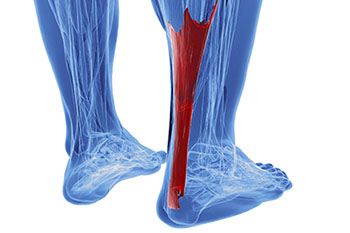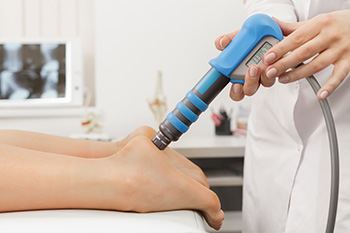Connect With Us
Achilles Tendon

The Achilles tendon is not only the strongest, but also the largest tendon in the human body. The main function of the Achilles tendon is to transmit power from the calf muscles to the heel and the foot.
It’s because of the Achilles tendon that we are able to stand on our toes when walking, running, or jumping. Even with all of its strength, the Achilles tendon can be exposed to injury. Due to its limited blood supply and the high tensions placed on it, the Achilles heel can be left vulnerable if harmed.
Possible conditions that may arise due to injury of the Achilles tendon include tears, ruptures, tendinitis, peritendinitis, tendinosis, tendinopathy, and bursitis. When trying to diagnose if one has issues with their Achilles tendon, a podiatrist will commonly check for any pain, swelling, or discoloration around the heel or lower leg area. Different treatments for issues concerning the Achilles tendon vary, but may include over-the-counter or prescribed pain relievers for intense discomfort, alternating ice and heat therapy, custom-made orthotics, physical therapy, and in severe cases, surgery. To help prevent injury to the Achilles tendon, it’s recommended to regularly perform stretches involving the muscles of the lower leg.
If you or someone you know is experiencing pain or discomfort involving the Achilles region, seek out the help of a podiatrist for a proper diagnosis and treatment regime.
Shockwave Therapy

Shockwave therapy, or Extracorporeal Pulse Activation Technology (EPAT), is an effective non-surgical treatment for managing pain caused by a variety of disorders. In podiatry, shockwave therapy can be used to manage painful conditions in the foot and ankle that negatively affect mobility and quality of life.
Shockwave therapy works by generating pulse waves to produce kinetic energy. The kinetic energy is then converted into sound energy before being transmitted into the affected tissue to treat the pain at its source.
Shockwave therapy delivers successful non-surgical treatment to patients seeking convenience, less downtime, and less risk. A session of treatment typically lasts less than 10 minutes and allows patients to quickly return to regular activities.
Benefits:
- Non-invasive
- No anesthesia required
- No risk of infection
- No scarring
- No downtime
- Faster, easier healing
If you are suffering from heel pain, ankle pain, or general foot pain, shockwave therapy may be the solution for you. Please contact our offices at Chelmsford (978) 441-9241 or Newburyport (978) 463-0086 for more information.
